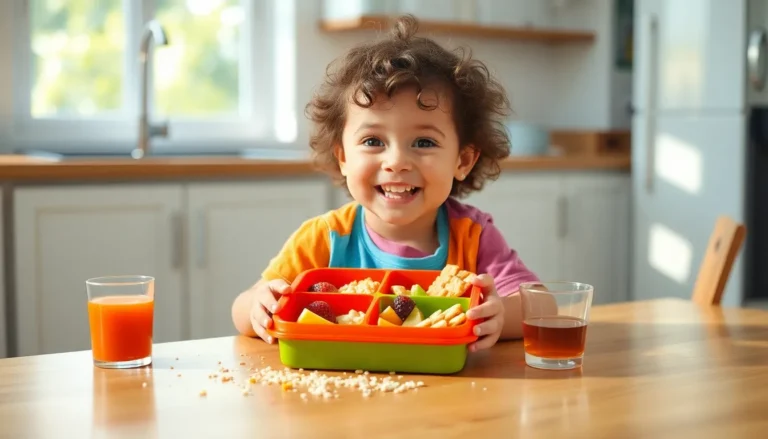Table of Contents
ToggleIn a world where tantrums can erupt like volcanoes and snack time is a high-stakes negotiation, toddler resilience is nothing short of remarkable. These pint-sized powerhouses tackle challenges with a mix of determination and sheer will, proving that even the smallest humans can bounce back from life’s little hiccups.
Understanding Toddler Resilience
Toddlers display remarkable resilience as they navigate their world. Daily challenges, like transitioning from playtime to bedtime, showcase their determination to adapt. Overcoming frustrations, such as sharing toys, highlights their ability to learn from experiences.
Developmentally, toddlers experience intense emotions. Emotional outbursts serve as expressions of their struggle to communicate needs. These challenges, while daunting, contribute to building coping mechanisms. They learn to manage emotions through practice and guidance.
Parental support plays a critical role in fostering resilience. Positive reinforcement encourages toddlers to try again despite setbacks. Providing a safe environment allows them to explore and take risks without fear. Children benefit from knowing they can rely on caregivers for support.
Play serves as a vital tool for developing resilience. Engaging in imaginative play nurtures problem-solving skills and creativity. Role-playing different scenarios prepares toddlers for real-life situations. These experiences help form the foundation for emotional and social growth.
Social interactions with peers further enhance resilience. Learning to negotiate during playdates introduces conflict resolution skills. Preschool settings create opportunities for teamwork, allowing toddlers to cultivate collaboration. Shared experiences promote empathy, an essential component of resilience.
Toddler resilience manifests through various developmental processes. By embracing challenges, they become equipped to handle future obstacles. Nurturing this growth enables them to thrive as they continue to explore their environment.
Factors Influencing Toddler Resilience

Toddlers develop resilience through several key factors. These elements interplay to shape their ability to bounce back from challenges.
Emotional Support
Emotional support plays a critical role in toddler resilience. Caregivers who offer empathy create an environment where toddlers feel secure expressing their feelings. Positive reinforcement encourages toddlers to maintain motivation despite difficulties. Consistent validation fosters confidence to navigate obstacles. The bond between parents and toddlers strengthens their coping skills, preparing them for future challenges. Supportive interactions build a sense of belonging, essential for emotional health.
Environmental Stability
Environmental stability contributes significantly to resilience. A stable environment provides toddlers with the security needed to explore and take risks. Predictable routines help them feel safe and grounded, essential for emotional development. Spaces filled with safety enable toddlers to engage in learning experiences without fear. When caregivers maintain consistent rules and boundaries, toddlers gain a greater understanding of expectations. This stability allows for effective emotional regulation and promotes adaptive behaviors in various situations.
Building Resilience in Toddlers
Toddlers can develop resilience through various supportive practices. Encouraging their natural problem-solving tendencies plays a significant role in this process.
Encouraging Problem-Solving Skills
Problem-solving skills flourish when toddlers are presented with age-appropriate challenges. Caregivers can introduce simple puzzles or construction games that require decision-making. By gradually increasing the complexity, toddlers can explore different strategies, boosting their confidence. Allowing them to encounter and resolve minor conflicts during playtime encourages independence. Offering praise for their efforts reinforces a growth mindset. Caregivers serve as guides, asking open-ended questions that prompt toddlers to think critically. These techniques build a strong foundation in problem-solving that enhances overall resilience.
Fostering Emotional Expression
Emotionally expressive toddlers learn to communicate their feelings effectively. Acknowledging their emotions validates their experiences, making them feel understood. Parents can model appropriate emotional language, encouraging toddlers to express joy, frustration, or sadness. Creating a safe space for these expressions promotes comfort and security. Engaging in activities like storytelling or art allows toddlers to explore complex feelings creatively. Sharing personal experiences helps caregivers connect with children on an emotional level. These strategies cultivate emotional intelligence, equipping toddlers with tools to navigate their feelings and respond to life’s challenges positively.
The Role of Caregivers in Promoting Resilience
Caregivers play a vital role in nurturing resilience in toddlers. They provide essential emotional support that fosters a secure environment for toddlers to express their feelings. Positive reinforcement encourages toddlers to face challenges, instilling a sense of confidence that helps them navigate obstacles.
Engaging in playful activities acts as a foundation for developing problem-solving skills. Caregivers can introduce age-appropriate challenges, like simple puzzles, to boost toddlers’ confidence and independence. Asking open-ended questions during play stimulates critical thinking, fostering a growth mindset that empowers toddlers.
Creating a safe space for emotional expression is crucial. By validating toddlers’ feelings and modeling appropriate emotional language, caregivers enable children to communicate their emotions effectively. Activities such as storytelling allow toddlers to explore complex emotions creatively and deepen their connection with caregivers.
Establishing consistent routines contributes significantly to environmental stability, providing toddlers with a sense of security. Predictable schedules help toddlers learn to adapt, equipping them with skills to manage expectations. Caregivers’ involvement in shared experiences, such as group playdates, enhances social interactions that nurture conflict resolution skills.
As emotional intelligence develops, toddlers become better equipped to handle life’s challenges. Encouraging empathy through both play and conversation nurtures an understanding of others’ feelings. Overall, caregivers influence toddlers’ capacity to engage with the world, empowering them to become resilient individuals capable of overcoming adversity.
Assessing Toddler Resilience
Assessing toddler resilience involves observing their responses to various challenges. Emotional expression plays a significant role in this evaluation. Through outbursts and interactions, toddlers reveal their ability to cope with frustration and loss. Caregivers should note how children manage transitions, such as moving from playtime to bedtime or sharing toys.
Observations during play provide insight into problem-solving abilities. Engaging with peers often highlights teamwork and conflict resolution skills. When toddlers negotiate sharing or resolve disputes, they demonstrate resilience. Parents and caregivers can gauge resilience by watching how children handle setbacks and express feelings.
Creating a safe environment for exploration enhances resilience. This includes offering consistent routines and supportive responses to emotional needs. Stability in these aspects contributes to children’s confidence in facing new situations.
Additionally, open-ended questions can help assess their critical thinking skills. Encouraging children to articulate their thoughts fosters emotional intelligence. Each effort made in this direction equips toddlers with adaptive behaviors necessary for future challenges.
Ultimately, regular monitoring of these behaviors informs caregivers about a toddler’s resilience levels. Understanding how children navigate difficulties helps in tailoring support to their unique needs. Meaningful connections and consistent reinforcement of positive behaviors encourage the development of resilience over time.
Toddler resilience is a remarkable quality that shapes their ability to navigate life’s challenges. By fostering a supportive environment and encouraging emotional expression, caregivers play a pivotal role in this development. Engaging in playful activities and establishing consistent routines not only boosts confidence but also equips toddlers with essential problem-solving skills.
As they learn to manage their emotions and interact socially, toddlers build a foundation for future resilience. Observing their responses and adapting support to their individual needs ensures that they continue to thrive. With the right guidance, toddlers can transform obstacles into opportunities for growth, setting the stage for a resilient future.




